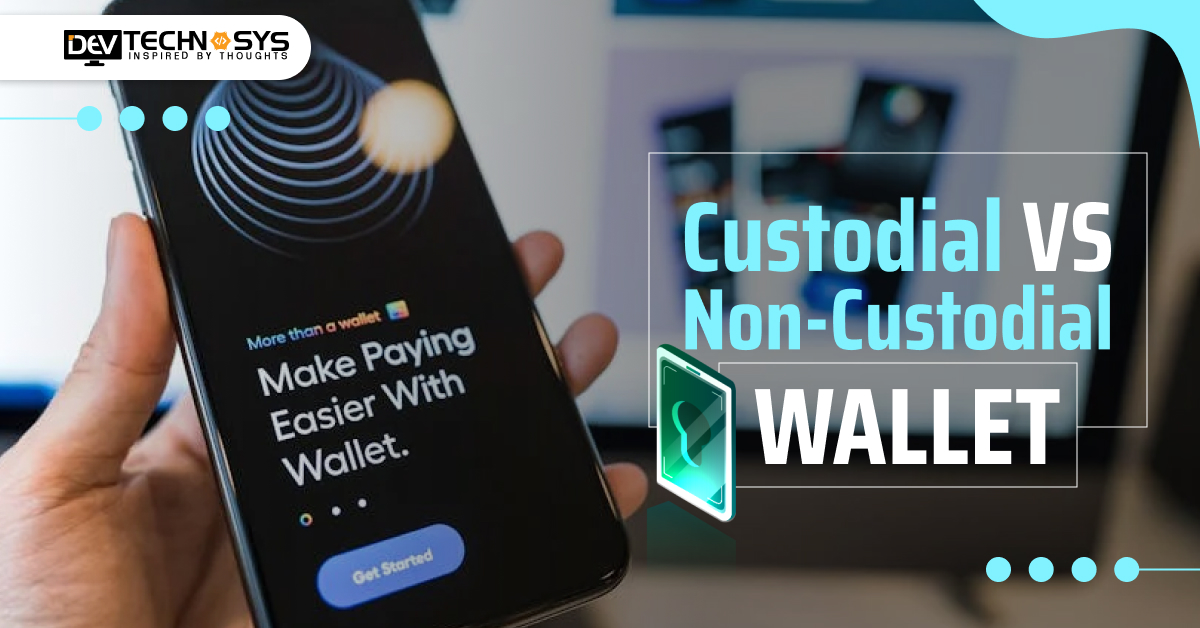“Custodial vs Non-Custodial Wallets”
As we can see how quickly digital currencies are increasing and people are getting attracted to them, in such a situation, people’s confusion is which wallet should be used to store the currency.
Popular wallets are custodial and non-custodial. But you are still confused about which one to choose?
We provide detailed information about these two wallets, just read the blog with full presence of mind.
As per the recent study, the non-custodial wallet market was valued at around $1.5 billion in 2023, and it is expected to increase to around $3.5 billion by the end of 2032.
The above figure shows how rapidly these wallets are growing and increasing their demand day by day.
In this blog, we will explore the difference between custodial vs non-custodial wallets and other useful information.
What is a Custodial Wallet?
A custodial wallet is a cryptocurrency wallet in which a third party, such as an exchange or service provider, stores and controls your private keys. This indicates that the supplier has control over your finances. It is user-friendly and includes services such as password recovery and customer assistance, but customers must trust the provider with their digital assets.
Pros of Custodial Wallets
Custodial wallets provide ease of use, account recovery, customer assistance, and controlled security, making them ideal for newbies and those who value simplicity over total control.
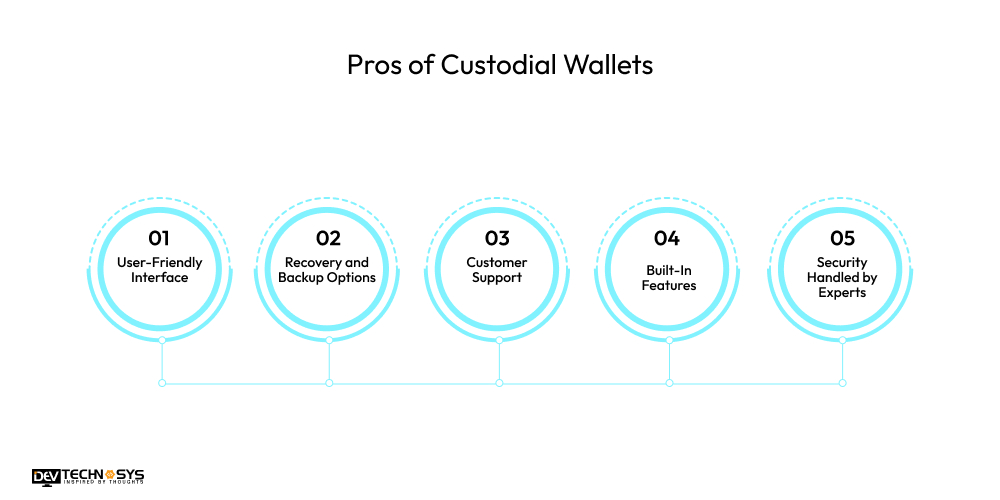
1. User-Friendly Interface
Most custodial wallets are meant to be simple, making them excellent for novices. The user is not required to comprehend private keys, blockchain transactions, or complicated security configurations.
2. Recovery and Backup Options
If you forget your password or lose access to your account, the provider can usually assist you in restoring it. This is a significant advantage over non-custodial wallets, because losing your private key typically means losing your cash permanently.
3. Customer Support
The blockchain development company includes support teams to assist customers with concerns such as failed transactions, account lockouts, and suspicious behavior.
4. Built-In Features
Many custodial wallets are connected with cryptocurrency exchanges, staking services, or other financial instruments, allowing for seamless trading, reward earning, and asset conversion without leaving the platform.
5. Security Handled by Experts
Because the service provider handles the wallet infrastructure, they frequently add robust security mechanisms like as multi-signature access, cold storage, and institutional-grade protocols, which individual users may struggle to execute successfully.
Cons of Custodial Wallets
With custodial wallets, users sacrifice full ownership, rely on third parties, face potential freezes, and risk security breaches due to centralized management and mandatory identity verification.
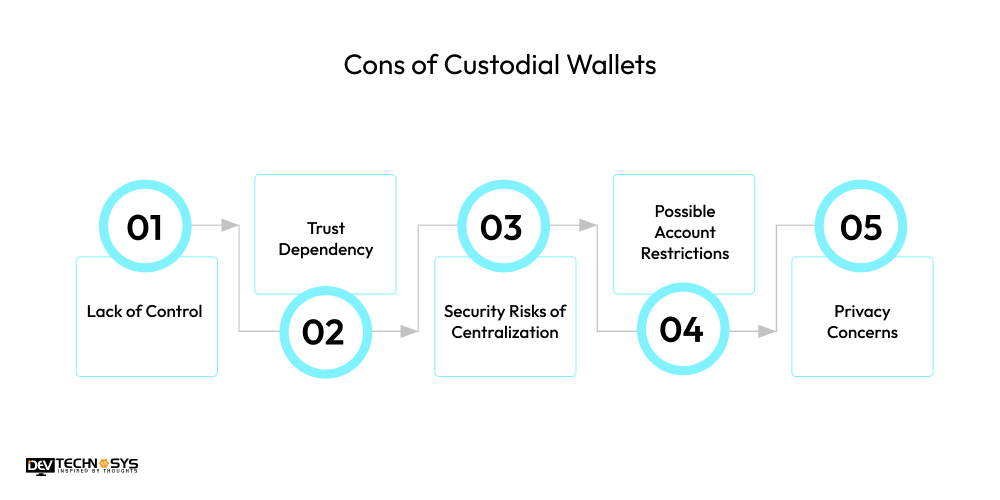
1. Lack of Control
With a custodial wallet, the provider owns your private keys, not you. This indicates that you don’t have complete control over your assets.
2. Trust Dependency
You must be certain that the supplier will not mismanage your cash, limit access, or go out of business. Several custodial wallet providers have crashed or been compromised throughout history.
3. Security Risks of Centralization
Custodial services are frequently targeted by hackers since they handle assets for several customers. If the crypto wallet development company is compromised, your funds may be jeopardized, even if you followed best practices.
4. Possible Account Restrictions
The provider has the authority to freeze, limit, or ban your wallet in response to regulatory obligations, suspicious conduct, or corporate policy, which non-custodial wallets do not have.
5. Privacy Concerns
Custodial wallets sometimes need Know Your Customer (KYC) information, such as identification verification, and may track user activities, resulting in less privacy than decentralized alternatives.
Benefits of Custodial Wallets
Custodial wallets offer a user-friendly experience, professional security management, account recovery, and integrated features like trading and support. Ideal for beginners, they reduce complexity while providing safety and convenience in handling digital assets.
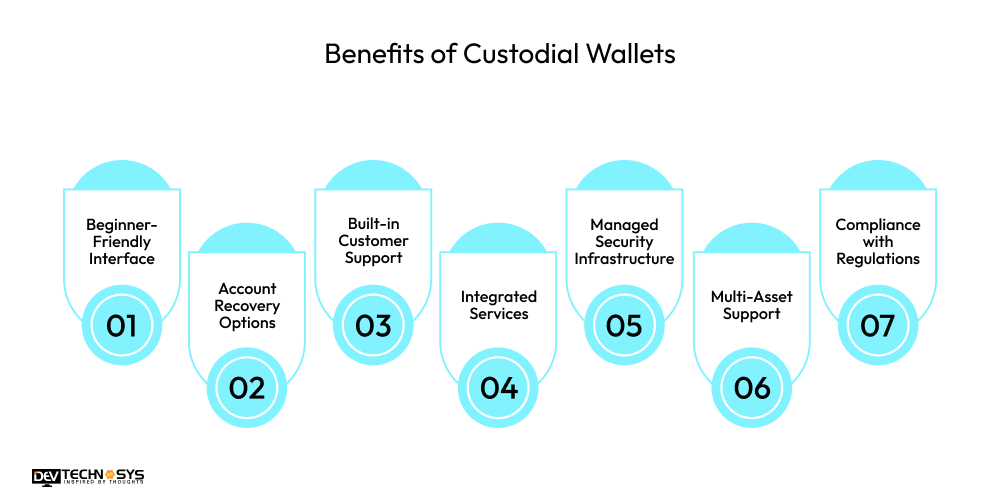
1. Beginner-Friendly Interface
Custodial wallets are user-friendly, making them ideal for cryptocurrency newbies. They often include straightforward interfaces, simple navigation, and helpful tutorials that shorten the learning curve, allowing users to transmit, receive, and handle cryptocurrency without having to comprehend blockchain or private key management.
2. Account Recovery Options
One significant advantage of custodial wallets is the ability to restore access. If you forget your password or login information, the provider can verify your identity and assist you recover your account. According to the cryptocurrency exchange development services provider, this safety net is critical for users who might otherwise lose permanent access to their funds.
3. Built-in Customer Support
Custodial wallets frequently provide live customer service or help centers. Whether you’re facing transaction troubles, security worries, or technical difficulties, having access to a support staff gives confidence and practical assistance that non-custodial wallets often don’t.
4. Integrated Services
Many custodial wallets are connected to bigger platforms that provide integrated services like as cryptocurrency trading, staking, lending, and fiat conversions. This ease enables customers to manage all of their digital assets in one location, without having to transfer between apps or platforms for each job.
5. Managed Security Infrastructure
Custodial services often employ specialized security teams and use advanced procedures like as cold storage, multi-signature verification, and frequent audits. These methods can provide greater protection than individual users could install alone, lowering the risk of asset loss due to human error or inadequate security standards.
6. Multi-Asset Support
Custodial wallets frequently support a variety of coins and tokens. Users may store, trade, and manage different digital assets from a single account, eliminating the need for several wallets or applications and streamlining portfolio management.
7. Compliance with Regulations
Custodial wallets usually adhere to banking rules and KYC (Know Your Customer) requirements. While this diminishes privacy, it provides credibility and conforms to regulations in many places, which might be advantageous for users who value legal compliance and institutional-grade service.
5 Best Custodial Wallets
These best self custody crypto wallets offer strong security, easy access, and integrated features—perfect for users who prioritize convenience, professional management, and peace of mind.
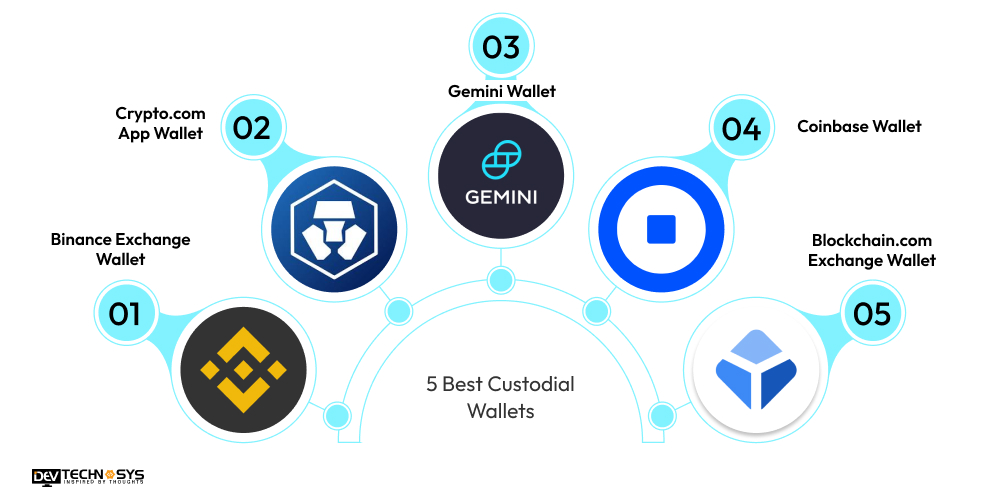
1. Binance Exchange Wallet
Binance offers a robust custodial wallet that is directly connected to its innovative trading platform. It supports hundreds of cryptocurrencies and includes features such as staking, savings, and cryptocurrency loans.
For businesses looking to build on this ecosystem, partnering with a Binance smart chain development company can help create powerful, scalable blockchain solutions fully integrated with Binance’s infrastructure.
2. Crypto.com App Wallet
Crypto.com’s custodial wallet is part of its extensive app ecosystem. It enables users to purchase, trade, and store cryptocurrency, receive rewards, and spend with a Visa card. The platform also provides staking and DeFi options, which are all controlled through a secure, centralized wallet with 24/7 customer assistance.
3. Gemini Wallet
Gemini’s custodial wallet prioritizes security and regulatory compliance, particularly among US consumers. It provides digital asset insurance as well as institutional-grade storage, making it popular among cautious investors. Gemini also lets you to earn interest on your cryptocurrency balances, combining trustworthy custodianship with passive income and peace of mind.
4. Coinbase Wallet
Coinbase’s custodial wallet is widely regarded for its simplicity, robust security, and regulatory compliance. Apps like Coinbase allow users to purchase, trade, and store a diverse range of cryptocurrencies. The site also provides FDIC-insured USD balances and excellent customer service, making it suitable for both new and casual investors.
5. Blockchain.com Exchange Wallet
Blockchain.com’s custodial wallet is connected with its cryptocurrency exchange, providing consumers with a smooth trading and storage experience. It supports a variety of coins and has a simple UI. Users can also choose a non-custodial option if they want more control over their private keys.
What is a Non-Custodial Wallet?
A non-custodial wallet is a cryptocurrency wallet in which you have complete control over your private keys and digital assets. Unlike custodial wallets, no third parties may access or handle your money. While this gives you more privacy and independence, it also means you are alone responsible for security and recovery—if you lose your keys or backup, your assets may be irrecoverable.
Pros of Non-Custodial Wallets
Non-custodial wallets offer complete ownership of your crypto, enhanced privacy, and unrestricted access to decentralized apps—ideal for users who value independence, security, and control over their assets.
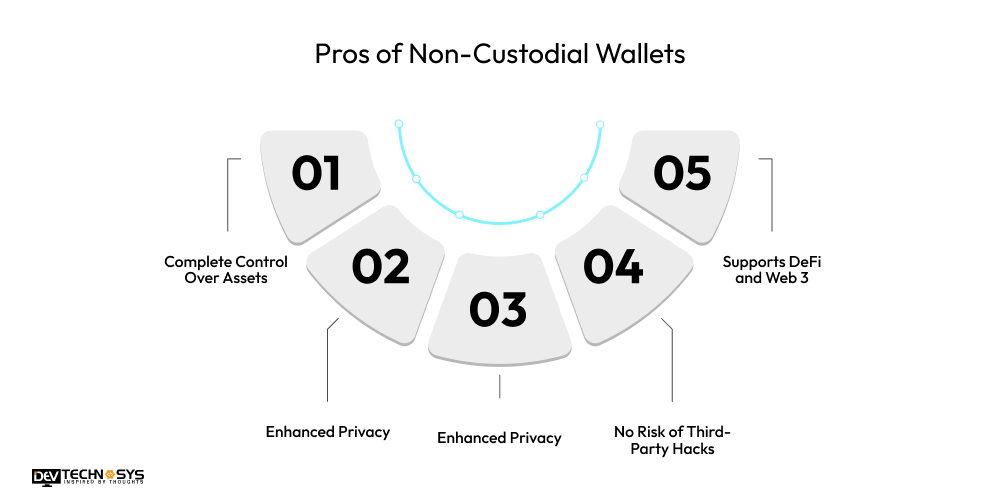
1. Complete Control Over Assets
Non-custodial wallets let you keep your private keys, ensuring total ownership and access to your cash at all times. No third party may freeze, access, or tamper with your wallet.
2. Enhanced Privacy
Non-custodial wallets normally do not require KYC (Know Your Customer) authentication, allowing you to utilize them without providing personal information. This is great for individuals who value privacy and wish to do transactions anonymously.
3. Censorship Resistance
Your wallet cannot be regulated, banned, or shut down since it is not controlled by a centralized authority. This is particularly significant in nations with stringent financial rules or capital controls.
4. No Risk of Third-Party Hacks
Because your private keys are held locally (or in a hardware wallet), non-custodial wallets minimize the risk of centralized exchange hacks, which have cost billions of dollars in cryptocurrency over the years.
5. Supports DeFi and Web 3
Non-custodial wallets are required for engaging with decentralized apps (dApps), staking, NFTs, and DeFi platforms such as Uniswap or Aave. They provide direct access to blockchain technology networks, bypassing middlemen.
Cons of Non-Custodial Wallets
While offering full control, non-custodial wallets demand strong security habits, technical know-how, and careful backup management—making them risky for inexperienced users or anyone prone to losing access credentials.
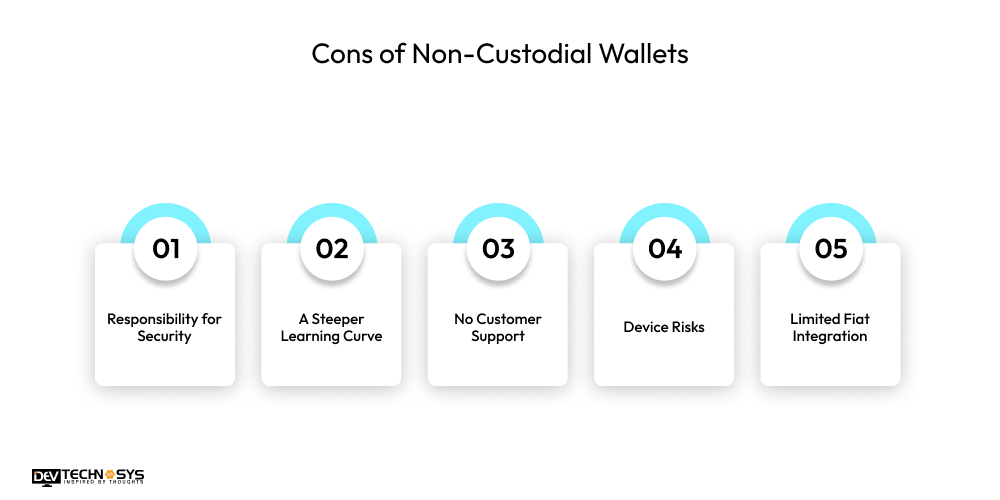
1. Responsibility for Security
You are completely responsible for the protection of your wallet. If you lose your seed phrase or private key, you cannot retrieve your cash. The lack of backup or customer assistance poses a significant danger.
2. A Steeper Learning Curve
Non-custodial wallets need a greater grasp of cryptocurrency operations. Hire blockchain developers to setting them up, maintaining keys, and engaging with blockchain features may be complex for newcomers, resulting in costly blunders.
3. No Customer Support
If you have a technical problem or make a transaction error, there is usually no customer assistance to help you. You’re responsible for resolving issues and troubleshooting faults.
4. Device Risks
If your device is compromised (via malware or phishing), your private keys may be taken. Because there is no third party to assist, if monies are stolen, they are likely lost forever.
5. Limited Fiat Integration
Most non-custodial wallets do not enable direct fiat on-ramps or off-ramps (purchasing cryptocurrency with conventional currency), forcing users to use different services or exchanges, which can be problematic.
Benefits of Non-Custodial Wallets
Non-custodial wallets empower users with complete ownership of their crypto assets, enhanced privacy without KYC, and direct access to decentralized apps. They offer censorship resistance, reduce third-party risks, and provide flexible, portable, and trustless management—ideal for those valuing security and autonomy.
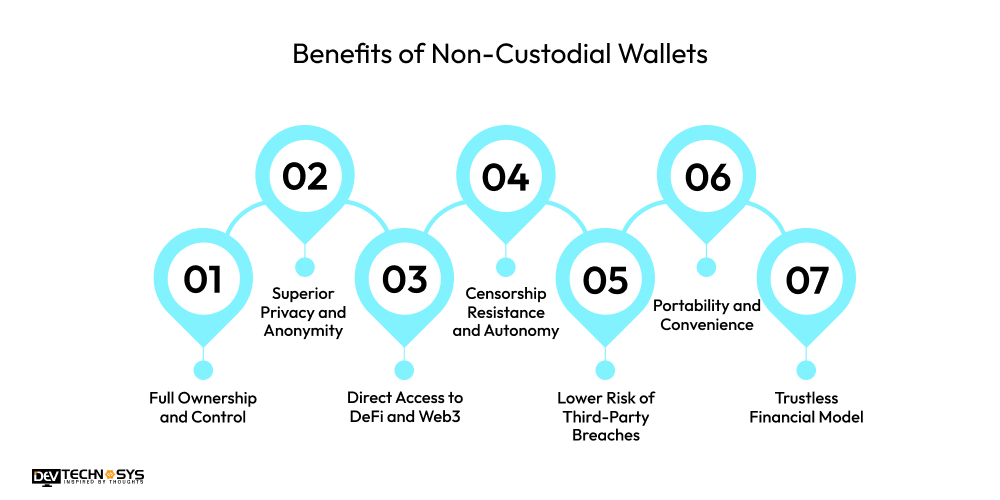
1. Full Ownership and Control
Non-custodial wallets provide you exclusive custody of your private keys, allowing you to access and manage your cryptocurrency holdings. This minimizes dependency on third parties, lowering the danger of account freezes and cyberattacks on centralized systems. You have complete control over your finances, which aligns with the concept of genuine financial sovereignty.
2. Superior Privacy and Anonymity
Non-custodial wallets often do not require personal information or KYC verification, which protects your privacy. This makes them excellent for individuals that value secrecy and prefer to keep their crypto activities secret. Controlling your own keys keeps your transactions private, eliminating the danger of data sharing or surveillance by third parties.
3. Direct Access to DeFi and Web3
Non-custodial wallets allow for smooth interaction with DeFi platforms, NFT markets, and other blockchain applications. You may interact directly with smart contracts and decentralized apps (dApps) in a trustless environment, gaining access to a diverse choice of financial services, investment possibilities, and digital asset management alternatives.
4. Censorship Resistance and Autonomy
Because you control your private keys, no government, exchange, or third party may limit, freeze, or take your money. This resilience to censorship means that you have continuous access to your assets, even in restricted regions or during platform outages, giving you full financial independence and liberty.
5. Lower Risk of Third-Party Breaches
Because your private keys are held locally or on hardware devices, your monies are safe against centralized exchange hacks or insolvencies. This decreases the danger of asset loss due to breaches, mismanagement, or fraudulent activity by custodial providers, hence considerably improving the security of your cryptocurrency holdings.
6. Portability and Convenience
Non-custodial wallets exist in a variety of formats, including mobile applications, desktop software, and hardware devices, allowing you to safely manage your cryptocurrency from anywhere. With the help of a blockchain wallet development services provider, you can engage with blockchain networks and access your assets without relying on internet-based custodial services, which is both convenient and secure.
7. Trustless Financial Model
Non-custodial wallets encapsulate the essential blockchain notion of trustlessness by removing the need for a third party to manage your cash. You don’t have to worry about a service provider’s financial stability, security practices, or regulatory compliance. This autonomy provides you with complete transparency and control, allowing you to deal freely on your own terms.
5 Best Non-Custodial Wallets
Top non-custodial wallets provide full ownership of your cryptocurrency, robust security features, simple access to decentralized apps, and privacy—ideal for those wanting autonomy and complete control over their digital assets.
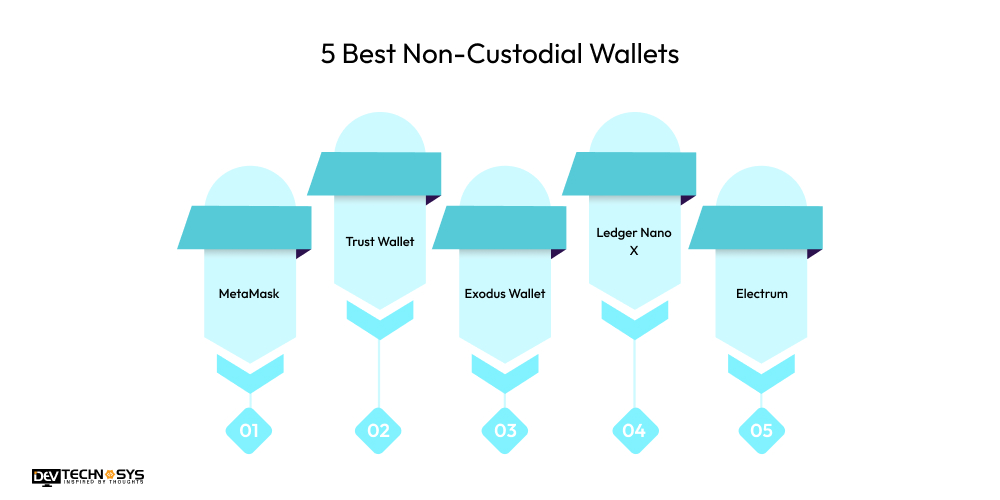
1. MetaMask
MetaMask is a popular browser plugin and mobile wallet that lets you handle Ethereum-based assets. It enables smooth interaction with dApps and DeFi platforms. MetaMask is popular for Web3 access and handling Ethereum and ERC-20 tokens because to its ease of setup and robust security features.
2. Trust Wallet
Trust Wallet is a mobile-first non-custodial wallet that supports several blockchains, including Ethereum, Binance Smart Chain, and others. If you develop crypto wallet apps like Trust Wallet, it has complete control over private keys, a built-in Web3 browser for dApps, and staking capabilities. Its user-friendly interface and extensive asset support make it popular among both new and veteran users.
3. Exodus Wallet
Exodus is a non-custodial desktop and mobile wallet with an easy interface and built-in trading capabilities. It supports over 100 cryptocurrencies and includes portfolio tracking and hardware wallet integration, making it easy for users to manage different crypto holdings while maintaining excellent security.
4. Ledger Nano X
The Ledger Nano X is a hardware wallet that provides durable offline storage for private keys while maintaining one of the highest levels of security. It supports a wide range of cryptocurrencies, connects to mobile devices via Bluetooth, and integrates with multiple software wallets.
Businesses aiming to offer similar secure solutions can benefit from partnering with a fintech app development company to build innovative and user-friendly digital asset management tools.
5. Electrum
Electrum is a lightweight, Bitcoin-focused non-custodial wallet known for its speed and security. It has sophisticated functionality like as multi-signature wallets and hardware wallet integration. Electrum’s open-source nature and robust encryption make it a reliable solution for Bitcoin users who value security and control.
Difference Between Custodial vs Non-Custodial Wallet
Custodial wallets offer ease and support but limit control, while non-custodial wallets provide full ownership and privacy—placing security responsibility entirely on the user for true decentralized asset management. Let’s explore the difference between custodial vs non-custodial wallet:
Feature |
Custodial Wallet |
Non-Custodial Wallet |
| Private Key Ownership | Held and managed by a third-party provider | Fully controlled and owned by the user |
| Control Over Funds | Limited; provider controls access and transactions | Full control; user signs and authorizes all transactions |
| Security Responsibility | Provider responsible for security and backups | User responsible for securing private keys and backups |
| Account Recovery | Available via provider (password resets, support) | No recovery options; loss of keys means loss of funds |
| User Experience | Beginner-friendly with simple interfaces | Requires more knowledge; potentially complex setup and usage |
| Privacy | Requires KYC/AML; user data collected | No KYC needed; better privacy and anonymity |
| Access to DeFi/DApps | Limited; often restricted or through the provider’s app | Full, direct access to decentralized apps and protocols |
| Risk of Hacks | Higher due to centralized storage; provider risk | Lower centralized risk, but vulnerable to device-level threats |
| Censorship & Restrictions | Possible freezing or limiting access by provider | No censorship; user controls wallet without restrictions |
| Fiat Integration | Often integrated with exchanges and fiat gateways | Usually requires third-party services for fiat on/off ramps |
| Multi-Asset Support | Typically supports many assets, depending on provider | Varies by wallet; many support multiple blockchains |
| Regulatory Compliance | Must comply with local laws and regulations | Generally operates without regulatory constraints |
| Backup Complexity | Provider handles backups | User must securely store seed |
| Customer Support | Available for troubleshooting and assistance | No official support; user must self-manage issues |
| Examples | Coinbase, Binance, Crypto.com | MetaMask, Trust Wallet, Ledger Nano X |
Conclusion
In conclusion, knowing the difference between custodial vs non-custodial wallets helps people keep their crypto safe. Self-custodial wallets are easy to use because a company looks after your money, but you don’t have full control.
Non-custodial wallets give you full control, but you need to be careful with your keys. If a business wants to make a good and safe wallet for users, they can work with an e-wallet app development company to build the best wallet that is both safe and easy to use.
Frequently Asked Questions
1. What is the Main Difference Between Custodial vs Non-Custodial Wallets?
The main difference is who controls the private keys. In a custodial wallet, a third party holds your keys and manages your funds. In a non-custodial wallet, you control the keys and have full ownership of your assets.
2. Do I Need to Complete KYC for Both Wallet Types?
No, you don’t need to complete KYC for both types. Self custodial wallets usually require KYC due to regulations, while non-custodial wallets typically don’t, offering greater privacy and anonymous access to crypto and decentralized apps.
3. Can I Access DeFi Apps with Custodial Wallets?
Generally, custodial wallets do not allow direct access to DeFi apps, as the third-party provider controls your assets. To interact with DeFi platforms and smart contracts, you need a non-custodial wallet that gives you full control over your funds.
4. Do I Need Internet to Use a Non-Custodial Wallet?
Yes, you need an internet connection to send or receive transactions with a non-custodial wallet. However, some hardware wallets can generate and store transactions offline, then connect later to broadcast them securely.
5. Can I Store Multiple Assets in a Non-Custodial Wallet?
Yes, many non-custodial wallets support multiple assets across various blockchains. Popular wallets like Trust Wallet and Exodus allow users to store, send, and receive a wide range of cryptocurrencies within a single secure and user-controlled interface.
6. What is the Difference Between a Wallet and An Exchange?
A wallet stores your cryptocurrency securely, giving you control over your funds. An exchange is a platform where you buy, sell, or trade crypto, often including a wallet but managed by the service provider.
